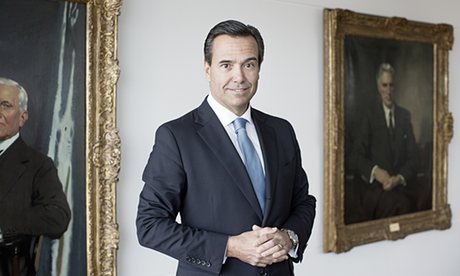 Above, Chief Executive, Senhor Antonio Horta-Osório.
Above, Chief Executive, Senhor Antonio Horta-Osório.
Lloyds Bank 3rd quarter results have been released and there has been a 15% decline in profits as the bank sets aside another £1bn for PPI.
Quite frankly, this was to be expected. The authorities have decided to extend the period for PPI claims into 2019. The bank was hoping for the PPI deadline to be set in 2018.
Analyst Gary Greenwood at Shore Capital said the profit performance was largely as expected, with the real highlight being “much stronger than expected” capital generation that allowed guidance to be reiterated. “Capital generation has been a key concern for the market so we think this will be taken well.”
Of course Lloyds Bank is a huge company and many folks employed there will have been involved in securing the good (under the circumstances) results that have been secured. It must however be said that the bank has prospered under the stewardship of it’s Chief Executive, Senhor Antonio Horta-Osório.
Senhor Horta-Osório is a man facing many challenges. Apart from the existential threat of economic catastrophe should Brexit fail two years following Article 50 invocation, the challenges facing Lloyds Bank (and it’s competitors in the UK retail banking sector) are the simple fact that the bank’s fortunes are allied with the fortunes of their customers. If the Uk economy does well and the Uk population do well, the bank will do well. The converse of course is also the case! In this sense we can say Lloyds Bank and Senhor Horta-Osório are to an extent are being controlled by events rather than them controlling events.
Sensibly however, Senhor Horta-Osório appears to be applying his energy and expertise to those things he can do something about and not those he cannot control. Mr Greenwood’s comments about capital creation – vital for a bank – demonstrate this.
One of the more controversial and difficult developments that Senhor Horta-Osório has had to deal with is the radical change in the way customers want their banking services delivered.
Traditionally, customers would visit branches to pay money and cheques in and to draw out cash. They would pay for goods with a cheque either handing it in person to the supplier or posting same.
There has been a revolution since those days. People routinely use and prefer to make financial transactions on line and using smart phones and other equipment. This means the need for branches on the high street has lessened enormously.
At this point we must give credit where credit is due to this Prime Minister and Chancellor of the Exchequer and their predecessors. An especial thank you must be made to Gordon Brown and Alistair Darling.
Why? We hear you ask Dear Reader.
Because these politicians effectively held the whip hand when the government owned 43% of the bank’s stock. At the time Lloyds Bank managers took the crucial decisions that were necessary to rationalise the management structures of Lloyds and Halifax and to cut costs and close branches. This meant making large numbers of hard working employees redundant. No competent or reasonable manager likes this task. In fact they dread it. Or should.
Obviously the trades unions protested – which of course is their role.
What would have happened in the past and would have happened under a government led by Comrade Corbyn is that the trades unions would have appealed to the Labour Party and the Prime Minister would have invited all to Number 10 for “beer and sandwiches”. At which point the directors of Lloyds Bank would have been told that the principal shareholder desired an outcome that did not result in job losses. This would have meant that Lloyds’s capital ratios would have had to have been further bolstered by taxpayer’s money and the losses (not profits) made absorbed similarly.
GOTO: http://uk.reuters.com/article/uk-lloyds-results-idUKKCN12Q0HG
AND: http://citywire.co.uk/wealth-manager/news/lloyds-profits-slump-15-as-it-sets-aside-another-1bn-for-ppi/a962834?re=42864&ea=403959&utm_source=BulkEmail_WM_Daily_EAM&utm_medium=BulkEmail_WM_Daily_EAM&utm_campaign=BulkEmail_WM_Daily_EAM
Declaration of Interest: The Editor is a beneficial shareholder of Lloyds Bank shares.
Speaking the Truth unto the Nation

I thought banks adjust margins and charges so they do well (nay VERY WELL) out of customers whatever the overall economic situation!!